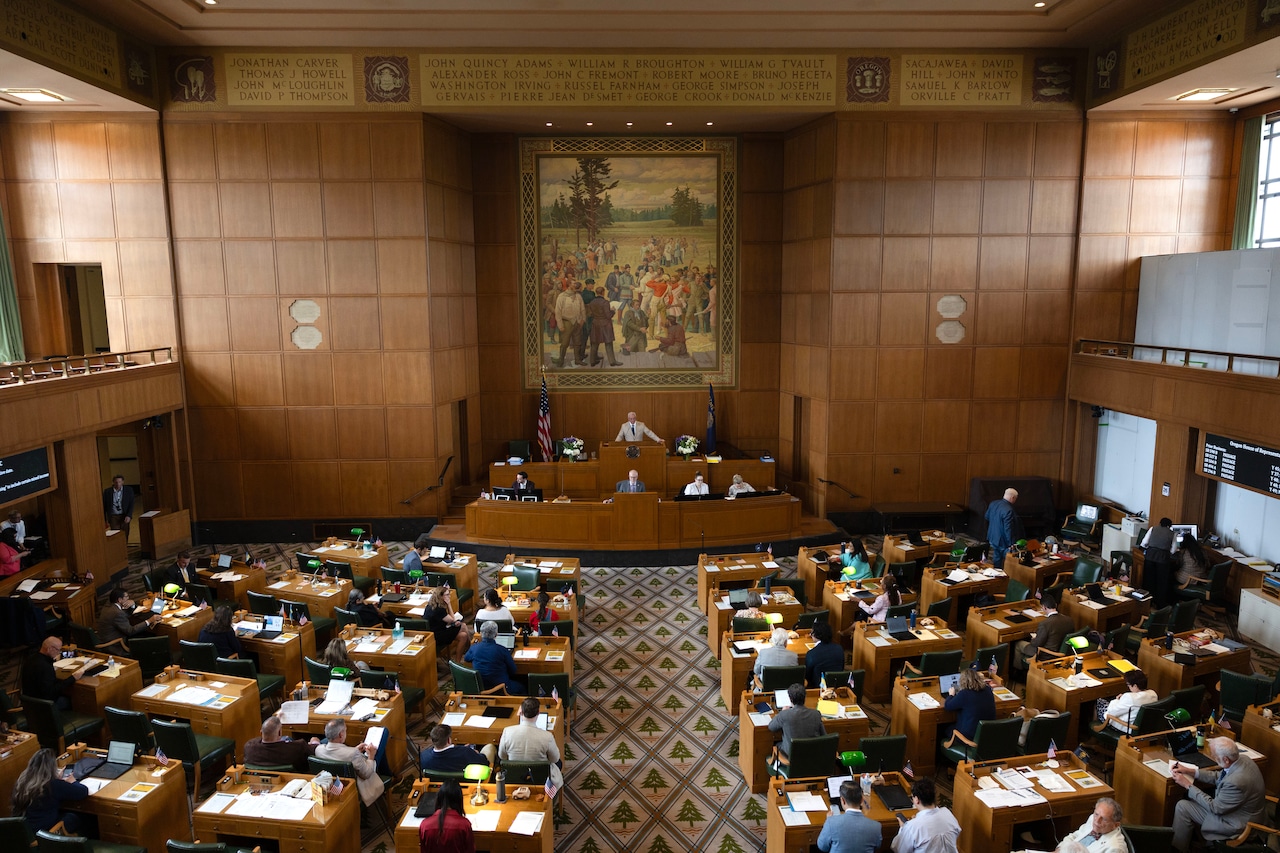Oregonians don’t have to agree with Rep. Dwayne Yunker that school districts should retain broad discretion to ban books. They don’t have to approve of the Republican legislator’s tactic of reading a sexually explicit passage from a controversial school library book to make his point.
But they should 100% object to the idea that Yunker’s reading of the passage as part of a political argument on the House floor constitutes harassing behavior. Unfortunately, an investigation commissioned by the Legislative Equity Office has concluded that Yunker’s actions could have created a hostile workplace and affected employees’ ability to do their jobs. The matter now goes to the Joint Committee on Conduct for consideration.
The investigation, conducted by Kia Roberts of Triangle Investigations for a sum of money that the equity office declined to disclose, details the March 17 floor session in which Yunker, a Republican from Grants Pass, read a passage graphically describing sex between two teen characters from “The Haters” by Jesse Andrews. The book was one that a mother in his district unsuccessfully sought to have removed from a high school’s library, and Yunker used the book to illustrate his opposition to Senate Bill 1098, as The Oregonian/OregonLive’s Carlos Fuentes reported. The legislation, which ultimately passed, restricts school districts from banning books due to themes of race, gender, sexual orientation, religion or disability.
Yunker’s comments came during “remonstrances” – a three-minute-or-less “protest” by a legislator to be entered into the official record. He stopped reading only after Rep. Kevin Mannix, R-Salem, twice objected, reflecting the discomfort that many people felt.
That was also, however, the point he was trying to make. While we may disagree with both his position and his methods – and the passage violated the House’s standards on not using “indecent or profane” language – his actions were relevant to the debate.
However, about a week and a half later, two unidentified people filed complaints about the reading for potentially violating “Rule 27,” a legislative branch personnel rule that prohibits harassment and outlines policies for creating a safe, respectful workplace at the Legislature. (Two other complaints alleging retaliation and objecting to comments on a separate day were not found to be possible violations).
Roberts interviewed unnamed witnesses who described feeling uncomfortable. One witness noted that Yunker is in a position of power and likened the situation to a boss reading erotica to her. She said she had to get up and leave, causing her not to be able to do her job. Another witness said she felt nauseous and also had to walk out.
For his part, Yunker sent the interviewer a letter outlining his objections to an investigation targeting his political comments. He also questioned whether Rule 27 infringes on free speech rights, particularly if it disciplines political speech or specific viewpoints.
It’s a valid question. Importantly, the rule notes the Legislature “recognizes that the constitutional protections guaranteeing freedom of speech and expression must be taken into account in determining the rights afforded to individuals in the State Capitol under this rule.” It also includes this passage: “The Legislative Branch emphasizes the importance of fostering an environment where all viewpoints are welcomed and respected, as disagreement does not equal harassment.”
However, Roberts did not address the potential free speech issue or even appear to consider the political context of Yunker’s comments on the House floor. Rather, she wrote that “continuous exposure to inflammatory language can erode self-esteem, create anxiety, and lead to chronic stress, which may affect both mental and physical health. When individuals are trapped in such hostile conditions without a clear avenue for relief or redress, the cumulative effect can result in decreased job performance, burnout, and even long-term trauma, fostering a workplace culture of fear and exclusion rather that respect and inclusion.”
Roberts missed a fundamental understanding of what happens in a legislative body. The act of legislating requires that lawmakers be able to represent their constituents, challenge each other’s viewpoints and thoroughly debate issues and consequences to ensure that legislation considers the broad impact on Oregonians across the state. Provided lawmakers are not inciting violence or maliciously targeting individuals, they should be able to advocate for their constituents without fear of being accused of creating a hostile workplace.
Politics is not a safe space. If people are offended by open debate, they should not be working in politics.
When the conduct committee meets to consider the issue, they should explore whether Rule 27 needs to be further clarified or if the Legislative Equity Office needs additional direction. And they should unanimously conclude that Yunker’s reading in no way created a hostile workplace.
-The Oregonian/OregonLive Editorial Board
Oregonian editorials
Editorials reflect the collective opinion of The Oregonian/OregonLive editorial board, which operates independently of the newsroom. Members of the editorial board are Therese Bottomly, Laura Gunderson, Helen Jung and John Maher.
Members of the board meet regularly to determine our institutional stance on issues of the day. We publish editorials when we believe our perspective can lend clarity and influence an upcoming decision of public interest. Editorials are opinion pieces and different from news articles.
If you purchase a product or register for an account through a link on our site, we may receive compensation. By using this site, you consent to our User Agreement and agree that your clicks, interactions, and personal information may be collected, recorded, and/or stored by us and social media and other third-party partners in accordance with our Privacy Policy.
